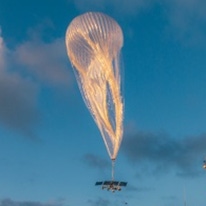Also in today's EMEA regional roundup: Iliad founder worried over 5G scare stories; Sunrise chooses Comarch for IoT expansion; Proximus parts merge.

Also in today's EMEA regional roundup: Iliad founder worried over 5G scare stories; Sunrise chooses Comarch for IoT expansion; Proximus parts merge.
Google spinoff Loon has launched its balloon-enabled Internet service in Kenya, bringing connectivity for Telkom customers to nearly 50,000 square kilometers across western and central parts of the country via 35 or so balloons up in the stratosphere. As this blog by Loon CEO Alastair Westgarth reports, early testing with Telkom indicated that downlink speeds of 18.9 Mbit/s and uplink speeds of 4.74 Mbit/s were possible with these floating cell towers. According to Loon, nearly 3.8 billion people, or "half of humanity," lack access to the Internet: We're gonna need more balloons…
Xavier Niel, the founder of French group Iliad, claims that the widespread protests against 5G risk lessening France's attractiveness to investors. He told Reuters: "5G is an element of attractiveness for our country … There is a moment when we are going to have to generate jobs in this country, so we need foreigners and investors to come here."
Switzerland's Sunrise Communications has chosen Comarch, the Polish OSS/BSS company, to support the expansion of its IoT services through Comarch's IoT Connect Platform software. According to Sunrise, the software will allow the operator to store, sell, connect, monitor and manage all the IoT devices on its network.
Two subsidiaries of Belgian operator Proximus are to merge by the end of the year. Codit, an IT services company, will tie the knot with Unbrace, which is described as "web application agency," and the new entity will operate under the Codit name. Proximus acquired Codit in 2018; Unbrace came on board a year earlier.
Deutsche Telekom has denied reports in German newspaper Handelsblatt that its relationship with Huawei had intensified, rejecting the claims as "contrary to reality." The German operator told Reuters that it had in fact scaled down its business with Huawei in the last three years.
Away from the geopolitics, Deutsche Telekom says it is building a number of testbeds for quantum technology throughout Europe, as part of the OpenQKD consortium that is looking to accelerate the development of "quantum-safe" data transmission.
Sky, the European pay-TV giant, has agreed a new long-term deal with Sony Pictures that gives Sky's customers in the UK, Ireland, Germany, Italy, Austria and Switzerland access to all recent and future Sony movie releases. The deal extends to users of Sky's streaming services such as Now TV.
Orange France has signed a power purchase agreement with Boralex, described as a pioneer in renewable energy and a leading independent producer of onshore wind power. Boralex will supply Orange with 67 GWh/year of renewable electricity produced by the 26 wind turbines at the Ally-Mercoeur wind farm in the Auvergne Rhône-Alpes region.
Coronavirus-related restrictions have been eased in the UK in recent days – but not in the city of Leicester, which has gone back into lockdown mode after a rise in infection rates. Responding to this, the country's main public service broadcaster, the BBC, has expedited the launch of its news service to Leicester's users of the Amazon Alexa smart speaker. The service will operate in both English and Gujarati, reflecting the high Asian population in the city. The move comes as part of a wider effort by the BBC to use smart assistants to offer new local-level services during the COVID-19 crisis.
Telefónica UK (O2) has had its knuckles rapped by the Advertising Standards Authority for a couple of press ads that, the authority judged, misled readers about the cost of buying an Apple iPad and a Microsoft Surface Pro on a monthly Airtime Plan. O2 was banned from running the ads again in their current form. Rival operator BT brought the initial complaint.
— Paul Rainford, Assistant Editor, Europe, Light Reading
Read more about:
EuropeAbout the Author(s)
You May Also Like










